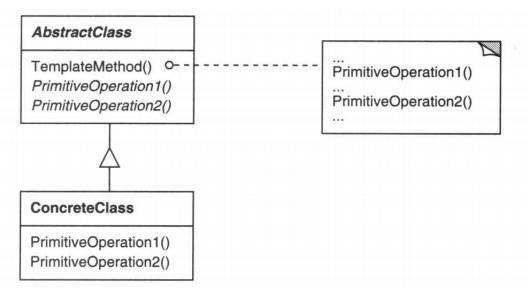1 模式简介
1.1 模版方法模式的定义: 模版方法模式在一个方法中定义一个算法的骨架,而将一些步骤延迟到子类中。模版方法使得子类可以在不改变算法结构的情况下,重新定义算法中的某些步骤。
1.2 结构

1.3 模式的组成
抽象类(AbstractClass): 定义抽象的原语操作(primitive operation) ,具体的子类将重定义它们以实现一个算法, 实现一个模板方法,定义一个算法的骨架。该模板方法不仅调用原语操作,也调用定义。 具体子类 (ConcreteClass): 实现原语操作以完成算法中与特定子类相关的步骤。
1.4 优缺点
模版方法模式的优点: 封装不变部分,扩展可变部分; 提取公共代码,便于维护; 行为由父类控制,子类实现。
模版方法模式的缺点: 每一个不同的实现都需要一个子类来实现,导致类个数增加,使系统更加庞大
模版方法模式的适用场景: 当类中有多个子类共有的方法 当有重要的、复杂的方法时,可以考虑作为模板方法
2 案例
抽象类
@FunctionalInterface
public interface MyPredicate<T> {
boolean test(T t);
/**
*过滤用户
*/
default List<Employee> filterEmployee(List<Employee> emps, MyPredicate<Employee> mp) {
List<Employee> list = new ArrayList<>();
for (Employee employee : emps) {
if (mp.test(employee)) {
list.add(employee);
}
}
return list;
}
}
具体子类
public class FilterEmployeeForAge implements MyPredicate<Employee>{
@Override
public boolean test(Employee t) {
return t.getAge() <= 35;
}
}
public class FilterEmployeeForSalary implements MyPredicate<Employee> {
@Override
public boolean test(Employee t) {
return t.getSalary() >= 5000;
}
}
模版模式调用
MyPredicate<Employee> myPredicate = new FilterEmployeeForAge();
List<Employee> list = myPredicate.filterEmployee(emps, myPredicate);
for (Employee employee : list) {
System.out.println(employee);
}
System.out.println("------------------------------------------");
List<Employee> list2 = myPredicate.filterEmployee(emps, new FilterEmployeeForSalary());
for (Employee employee : list2) {
System.out.println(employee);
}
Java8中的优化
MyPredicate<Employee> myPredicate = new FilterEmployeeForAge();
List<Employee> list = myPredicate.filterEmployee(emps, e -> e.getAge() < 36);
list.forEach(System.out::println);
System.out.println("------------------------------------------");
List<Employee> list2 = myPredicate.filterEmployee(emps, (e) -> e.getSalary() >= 5000);
list2.forEach(System.out::println);
java8函数式编程好处是可以减少具体实现类的使用,业务逻辑不复杂的时候可以使用,但接口只能定义一个抽象方法,必须满足函数式接口的定义。
[评论][COMMENTS]